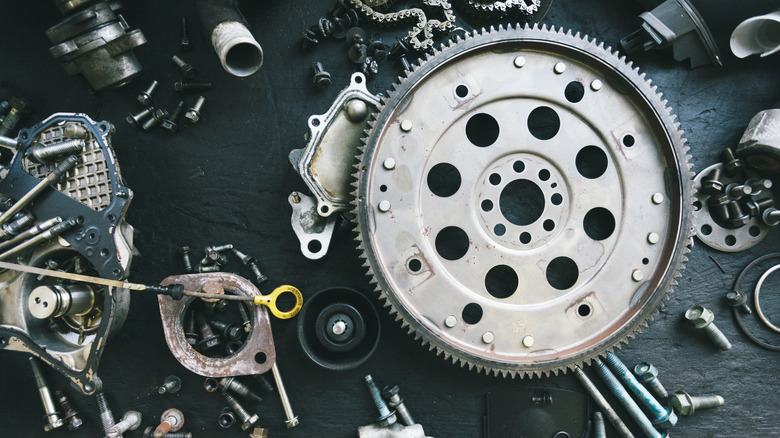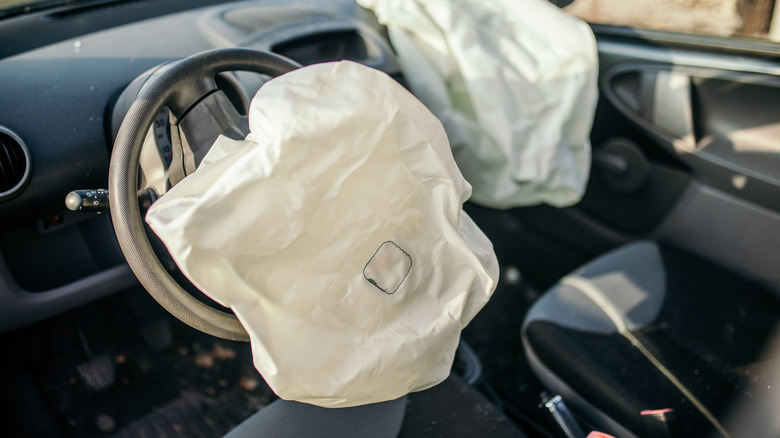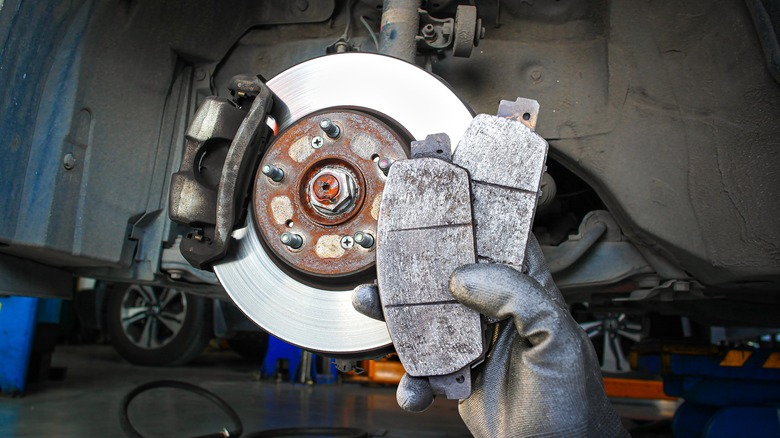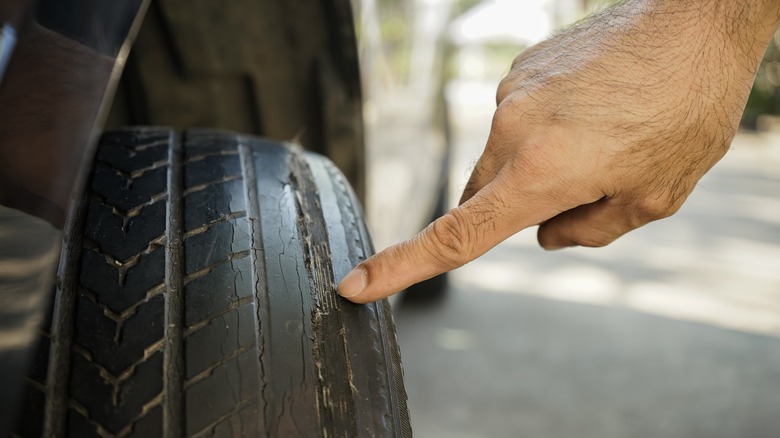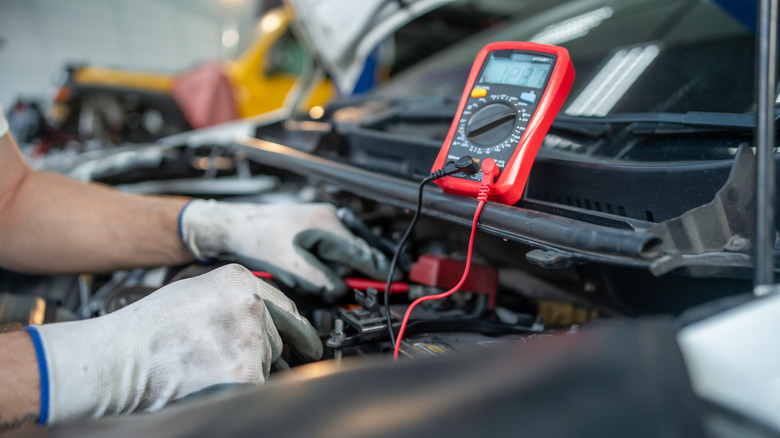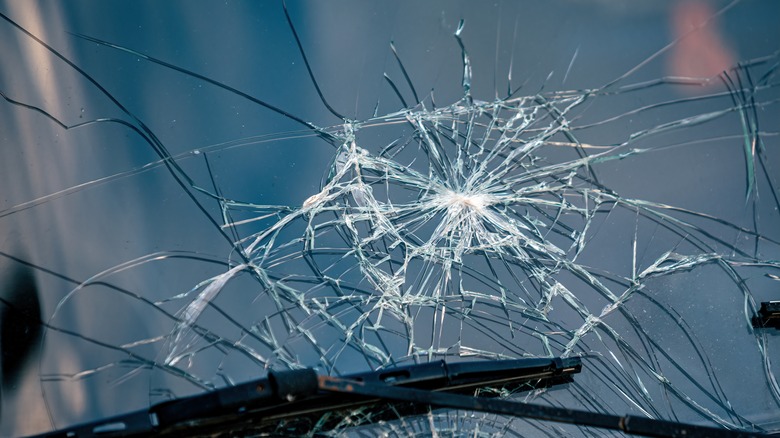5 Car Parts You Should Never Buy Used
Car parts are expensive, but if you keep your vehicle long enough and adhere to a regular maintenance schedule, at some point, you'll have to replace certain components. Many car owners consider buying used auto parts as a way to save on this expense. If you look hard enough, almost every auto part you might need can be found used, which can certainly help you and your wallet breathe a sigh of relief. After all, there's no shortage of places online and offline selling used car parts, including junkyards, online used parts retailers, auto recyclers, local mechanics, and even Facebook Marketplace.
While there are quite a few unexpected uses for old car parts, many sellers are more interested in making a quick buck than finding creative or sustainable ways to recycle them. As a result, you should exercise extra caution when buying used car parts, and there are some you shouldn't consider buying second-hand at all, including airbags, brake pads, tires, seat belts, and windshields. Although this isn't an exhaustive list — and you should always weigh the pros and cons when buying any used car part — avoiding buying these five parts used can go a long way toward ensuring you stay safe on the road and your car stays roadworthy for the long haul.
Avoid used airbags
If you're ever in an accident where your car isn't totaled, but your airbag deploys, you could end up in the unenviable situation of having to buy a replacement. There's no getting around the fact that replacing airbags is expensive, and if your insurance won't cover the cost, you might have to fork over a large sum of money to get a new one installed. However, attempting to save money by buying a used airbag isn't the way to go. That's because you can never guarantee that an airbag purchased through a third-party supplier is safe.
The problems with aftermarket airbag inflators are so concerning that the National Highway Traffic Safety Administration (NHTSA) issued a warning saying, "These suspect replacement parts are often manufactured by foreign companies with little to no reputation of quality manufacturing or experience, sold at prices far below the cost of quality genuine equipment, ordered online and shipped to the United States, and installed by those other than reputable repair shops or manufacturer dealerships."
While the NHTSA alert was specifically directed at used car buyers, the bottom line, is you should never buy a second-hand airbag. That's because it'll be almost impossible for you to verify that it hasn't already been deployed or damaged. Plus, there's always a risk that even if it looks ok, there's just no way of knowing that it'll work when you need it — or worse, it could deploy improperly and harm you.
Don't install used brake parts
Brakes are another critical safety system in your vehicle that's not worth gambling on with used parts. Whether it's time to replace your car's brake pads or the rotors, calipers, or other parts are past their prime, you're better off buying them new than trying to save a few bucks with used parts. Like with airbags, when you buy used brake parts, you can never know exactly what you're getting.
For example, brake pads lose their effectiveness over time, as they wear down and become thin. If you buy them used, they may have an uneven wear pattern or be approaching the end of their service life, which could lessen their braking efficiency, leading to increased stopping distances. In an emergency, this can put your safety and that of others on the road at risk.
When you buy used brake components, you won't know anything about the driving habits of the previous owner, and you might end up having to replace them shortly after buying them, defeating the purpose of buying them used. Even if you inspect used brake parts before purchasing them, you can never be sure how much wear or hidden damage they've sustained because sellers can clean them up, so they may appear to be in good condition.
Used tires can be a safety risk
Tires are another car part that is vital for keeping us safe when we drive. If you think about it, tires are the only contact point between your vehicle and the road, which means making sure they're maintained properly and in good condition should always be a priority. The U.S. Tire Manufacturers Association has sounded the alarm against buying used tires, explaining, "Once a used tire is resold as a replacement, it's a risky proposition for motorists. While new tires must meet stringent federal safety standards to be sold in the U.S., worn tires can be resold as used with virtually no restrictions." That should be enough to give anyone pause and convince them to reconsider whether mounting used tires on their car is worth the risk.
As with all auto parts you might buy used, the history of a used tire is impossible to decipher. You'll never know for sure whether the previous owner properly maintained the tires you're thinking about buying, or what types of hidden issues they might have. You don't necessarily have to spend extra money on expensive tires, but buying them new, even if you can only afford a cheap set, will at least give you access to safety information like whether the manufacturer has issued a recall. Keep in mind that even if you happen to find a set of used tires that haven't been used much, you should be cautious because tires degrade the older they get, even if they've never been on the road.
Used batteries may not last long
A common question that comes up when discussing the merits of buying used car parts is: Is it safe to buy a used battery for your car? Compared to your brakes, airbags, and tires, a battery isn't a critical safety component. However, that doesn't mean that buying one used is a good idea. The biggest risk from buying a used car battery is that it won't last as long as you expected, and you end up stranded on the side of a busy highway or in your driveway when you're already late for work because it's died on you.
Batteries have a limited lifespan, but on average last between three and five years. When you purchase a used battery, there's always a chance it's nearing the end of its service life, which means you could end up dealing with unexpected failures shortly after you buy it. As with all used auto parts, you won't be able to know with any certainty how the previous owner treated the battery or what conditions it was subjected to before you bought it. Many things can affect how long a battery lasts, including climate, driving habits, how often the vehicle was used, and whether the battery was properly maintained. While some sellers offer a limited warranty for used batteries, oftentimes, used batteries don't come with any guarantees.
Think twice before installing a used windshield
If you're in the market for a new windshield, you know there are quite a few types of car windshields you can choose from when upgrading or replacing your auto glass. You may be tempted to try to save a few dollars by buying a used windshield. However, this can come with some pretty significant risks. A windshield is likely to sustain damage when it's removed from a car, making the chances of you getting a used windshield without any flaws like chips or cracks unlikely. Another problem with used windshields is the same as with other used auto parts: you'll know very little about its past or how well it was maintained.
While you can get a decent idea of the condition of a used windshield by examining it in person, there may be minor defects that the supplier or salvage yard fixed, and you won't always know exactly what's been done. While the fact that they repaired the windshield may seem like a good thing, even seemingly small repairs can weaken the glass and affect its performance in a crash. You should also keep in mind that your auto insurance may not cover the cost of a used windshield, and some car warranties require the use of new OEM (original equipment manufacturer) parts to remain valid.
